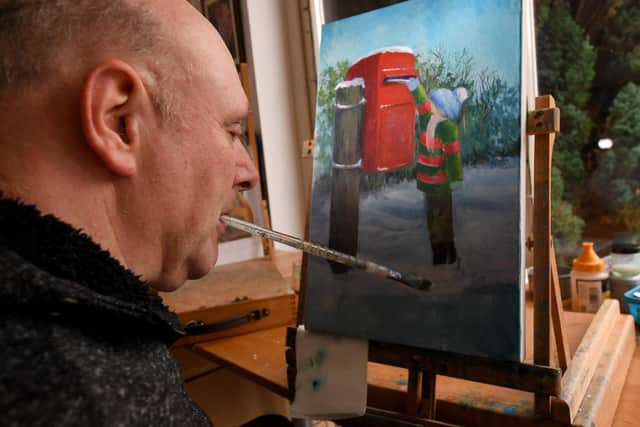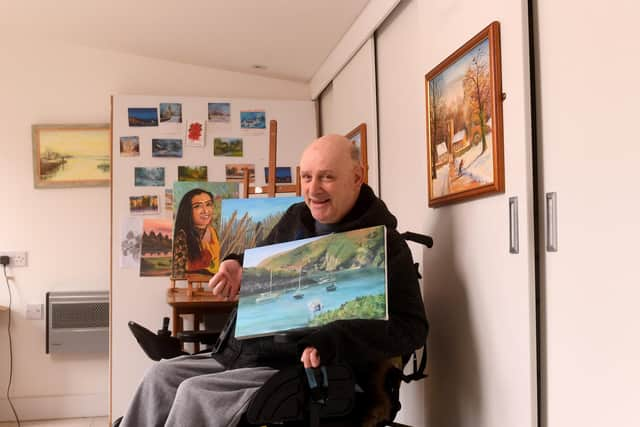How rugby accident changed life of training coal miner and launched career as a mouth painter
When David Cawthorne left school, he followed his brothers and stepfather into the obvious career path for a young man growing up in a coalfield community in the 1970s.
But his time in Fryston Colliery, in the West Yorkshire town of Castleford where he was born, would prove to be shortlived.
Advertisement
Hide AdAdvertisement
Hide AdFor David had not even completed his training to work on the coal face when he was involved in a rugby accident that completely changed his life and work at the age of just 18.


“Most employment in those days [in the area] was coal mining. It was an easy way of getting a job,” the now 61-year-old reflects. “That’s what people of my education went into.”
In his short time at the pit, David was introduced to the sport of rugby league, joining colleagues to play weekend games. But in his first season on the pitch in 1981, he was involved in a tackling accident in which he broke his neck and injured his spinal cord.
“It was a split second and that was it,” he says. “In my coal mining training, I’d had to do intensive first aid training just in case there’s problems underground...and I understood that what I’d done was a big problem at the very point of it happening…It was then a strange time, I didn’t really think about [the reality] too much of what it meant.”
Advertisement
Hide AdAdvertisement
Hide AdDavid spent the next six months in hospital. “My life had changed altogether,” he says. “Other people in the same situation would talk to you. Their lives had changed too and they helped by chatting about what they were up to. What do you do? You just get on with it, don’t you. There’s not a lot you can change.”


During his time in hospital, David was introduced to painting as an occupational therapy activity, another moment which changed his life. Painting with his mouth has gone from past-time to job in the years that have followed and one of David’s works has been selected for the January page of the 2024 Mouth and Foot Painting Artists (MFPA) calendar.
The art depicts two dogs enjoying a winter walk in a snowy scene. “I paint mainly landscapes and I can put into the scenery what I feel fits in well,” he says.
"The MFPA has given me a reason to get out of bed, broaden my horizons and allowed me a greater independence.”
Advertisement
Hide AdAdvertisement
Hide AdThe roots of the MFPA go back to 1956, when Erich Stegmann, a polio-stricken mouth painter, gathered a small band of disabled artists from eight European countries.
Their ultimate goal was to make a living through their artistic efforts, and to obtain a sense of work security that until then had eluded them.
Stegmann established the MFPA as a co-operative society. It is made up of artists who through accident, illness or disability paint using only their mouths and feet and it reproduces its artists’ work mainly in the form of greeting cards, calendars and books.
The sales of the products afford the artists financial independence, whilst giving representation to and empowering the disabled community.
Advertisement
Hide AdAdvertisement
Hide AdFrom the small group that Stegmann gathered for the inaugural meeting of the Association of Mouth and Foot Painting Artists, the organisation has now grown to represent nearly 800 members, from more than 70 countries around the world.
David has been part of it for more than 30 years, first joining in 1990. He was approached by a member who had seen his work being used as part of a fundraising campaign for the spinal unit at Pinderfields Hospital where David had been treated after his accident.
By that time, he says he had been painting “reasonably” for five years, supported by his wife Gillian, who has cared for him for the past four decades. “Painting gave me a past-time, the days were too long otherwise so that helped,” he recalls.
“It took a while to get used to doing it. It was a learning curve like everything else in life and my first attempts were really poor but I enjoyed doing it...It took a good long time until I felt what I was painting was worth any merit.”
Advertisement
Hide AdAdvertisement
Hide AdDavid initially joined the MFPA as a student member, receiving a scholarship to fund materials and tuition to help improve his standard of painting.
When a student has reached a standard judged to be the equivalent to that of non-disabled professionals, associate or full membership is then granted, a status which David achieved in 1998. He has since attended numerous international conferences, representing his fellow artists.
The MFPA explains: “Associate or full membership means that the member will receive a monthly income for life regardless of whether increasing disability makes it impossible for him or her to continue providing pictures that the association can market.
“This removes the greatest anxiety to haunt the disabled artist – the fear of losing one’s ability to paint through deteriorating health as the cost of independence for disabled people is high.”
Advertisement
Hide AdAdvertisement
Hide AdFor David, who works from a studio in his garden shed, the organisation has been life-changing. “Over the years, this is a lifestyle I probably would never have had…It makes my life worthwhile,” he says.
"Being paralysed and wheelchair bound for forty-some years, I think if I hadn’t been involved in the painting, my head wouldn’t be in a good place.
"It’s not just a past-time - it's something that gives you pleasure but also being involved in the association gives you an output you’ve got to work towards. You’ve got a life rather than an existence.”
To purchase the MFPA calendar and other products, visit www.mfpa.co.uk/shop
